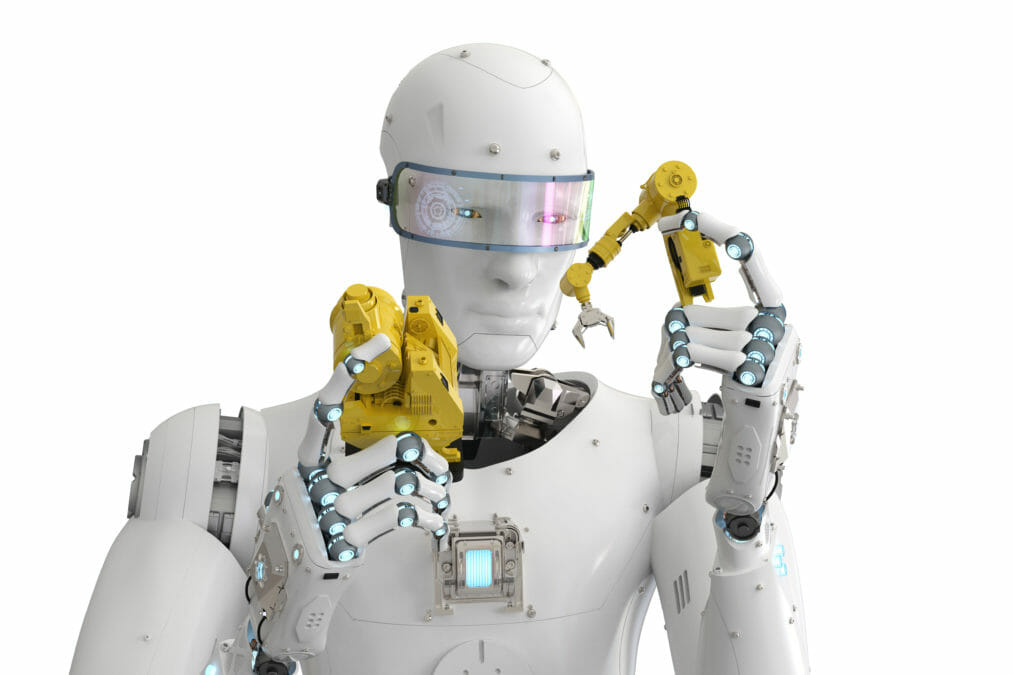A long-standing legal dispute to determine whether generative AI technologies can be named as the legal creators of their innovations has reached the highest court in the land, with a hearing at the UK Supreme Court on 2nd March 2023. A similar appeal hearing is underway at the US Supreme Court too.
These hearings have been brought by a group of academics and inventors who believe that a generative AI system, called Dabus AI, is solely responsible for its own innovative outputs, two of which are the subject of patent applications filed in the UK, Europe and the US. These innovations include a novel interlocking food container that is easy for robots to handle, and a warning light or beacon that flickers in a rhythm similar to neural activity, which makes it difficult to ignore.
Developed by Stephen Thaler in 1994, Dabus AI, also known as ‘The Creativity Machine’, is a computational paradigm that claims to replicate human cognition. It can create novel patterns of information and adapt to different scenarios without human intervention. Among its outputs, the machine has been credited with inventing a prominent design aspect of the Oral-B CrossAction toothbrush. The academics supporting the claims that Dabus AI should be recognised legally as an inventor are led by Professor Ryan Abbott of the University of Surrey.
>See also: The legal implications of ‘creative’, artificial intelligent robots
More generative AI is happening
Today, there are many examples of generative AI technologies being used to facilitate innovation processes. Among them are DALL-E and ChatGPT, which generate images and text based on a user’s prompts; and BioGPT, which can respond intelligently to biomedical questions.
Despite the undeniable ingenuity of these outputs, the question of who can be named as their inventor, and who has rights of ownership, has not yet been resolved through the courts. There is also a potential issue with regard to the outputs infringing existing IP rights. Without clarity on these points, some businesses could choose to avoid the use of generative AI systems altogether, or keep their use hidden for now.
>See also: An intelligent approach to AI and intellectual property
Global patent law says…
There is a consensus inherent in patent law globally that the owner of a patent is the inventor unless the rights have been assigned to another person, entity, or their employer. However, the law also requires that the inventor must be a person who has contributed in some material way to the invention’s conception. Therefore, under current law, only a human is capable of being named as inventor and the AI system is simply a tool they utilise as part of an innovation process.
Depending on what the UK and US Supreme Courts decide, there could be major implications for users of generative AI systems if the current legal position were to change. If AI systems such as The Creativity Machine are deemed to be capable of ‘inventing’ without any form of human intervention, this could lead to patents without ‘inventors’.
Allowing generative AI systems to be recognised as inventors could lead to further questions about the ownership of intellectual property. Currently, only a natural or legal person is able to own property, which means that a piece of software such as that used by an AI system, is not capable of owning property or assigning rights to property. If this were to change however, and a generative AI system is deemed to be the sole inventor, under current laws it could also be seen as the owner of the invention, which could have far-reaching consequences regarding ownership of patent applications and patented innovations. This situation could also disrupt accepted laws governing the rights of property ownership more widely.
Legal resolution is needed
Faced with the ongoing uncertainty regarding rights of ownership and inventorship, some innovators could opt to keep their use of generative AI technologies a ‘trade secret’ for the time being. Whilst this approach is understandable, the lack of published patent information concerning their use could slow progress by impeding R&D activity over time.
For society to benefit from the rich seam of innovation activity now taking place in the field of AI-based computer science, legal questions about inventorship and issues surrounding rights of ownership must be resolved as quickly as possible.
Diego Black is a partner at European intellectual property firm, Withers & Rogers. He specialises in advising innovation-led businesses in the fields of consumer electronics and computing
Related:
What is generative AI and its use cases? — Generative AI is the is a technological marvel destined to change the way we work, but what does it do and what are its use cases for CTOs?
The jobs most affected by generative AI — Research has found that around 300 million jobs across major economies are set to be affected by generative AI — here are the roles reported to be particularly exposed.
How ChatGPT will transform marketing — Marketing departments that do not embrace AI such as ChatGPT will find themselves at a disadvantage. But ultimately, although people can use generative AI, ChatGPT cannot run a business.







